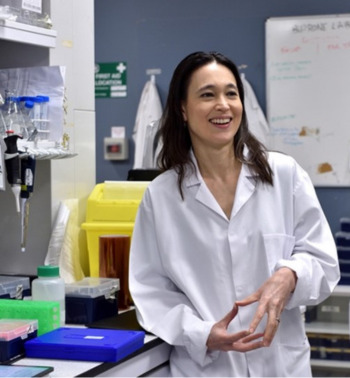11 November 2024
What is your role?
I'm a developmental neuroscientist, trying to understand how the brain wires up - in the right place and at the right time, and how these processes are altered in disorders of brain development such as autism and intellectual disability. I also enjoy teaching students, both undergraduate and postgraduate, mostly also about the brain, its anatomy and how it works.
What do you enjoy most about your role?
I most enjoy learning new things and tackling new challenges, so every day is exciting! Of course I love when people in the lab make new discoveries, but I also (luckily!) love problem solving, so that means it is always fun (as there is no shortage of problems....). I find trying to understand how the brain develops endlessly fascinating, so whether it is discussing our own research, or reading about all the work that is going on in the rest of the country or the world, I am always discovering and learning, which is wonderful.
What inspired you to get into this work?
Well, in fact I always wanted to be a neuroscientist, at least from the first time I can remember having an opinion. It seemed that understanding who we are and why we behave in the way we do has to be one of the most interesting questions, and as soon as someone suggested the brain was integral to this, I was pretty sure this was what I wanted to do. Of course, then I grew up and was told to be sensible, so I went to medical school and became a doctor with the idea of becoming a neurologist. But when I was at university I did a course in developmental neuroscience and eventually decided to come back to this topic.
What attracted you to rare disease?
At least for neurodevelopmental disorders, I think it is likely that common disorders could well be made up of many rare disorders, and therefore it makes sense to study these. I also think it’s important for these rarer disorders not to be ignored because of some perceived sense that treatments will be less profitable, although in fact I think that discoveries related to rare disorders may well be relevant to many others as well.
What do you think people in the Rare Disease Network would find most surprising about you?
Something surprising about me? I guess, I had my own brush with a rare disorder when I had a spontaneous intracerebral hemorrhage due to an arteriovenous malformation about two years ago! And this was ironic in that I actually lecture the medical students on causes of hemorrhagic stroke, and never bothered to include AVMs as they are so rare…!
Do you have any current projects that you’d like to tell us about?
We are working on an exciting collaborative project with Jernej Ule and Ben Blencowe to develop RNA-based strategies which might allow context-dependent regulation of gene therapy. Very early days, but could have a lot of potential.
What are the benefits of working in partnership?
You can't do much on your own, and it's also no fun. Partnerships bring new ideas and expertise, and the team is greater than the sum of its parts. Almost all of science is now about teamwork - you don't see many single author papers anymore.
What would be your one career top tip?
I'm going to borrow an invented word from a podcast I like - 'persevilience'. It brings together a heady mixture of perseverance and resilience. Nothing ever goes perfectly smoothly, and there will be obstacles along the way, but the best way to success is to keep trying and don't give up when things go wrong. And don't forget to enjoy what you're doing, of course!
Hear from Prof Andreae at the KHP Rare Disease Network Event: Driving Change for Transformative Impact on 12 December.





